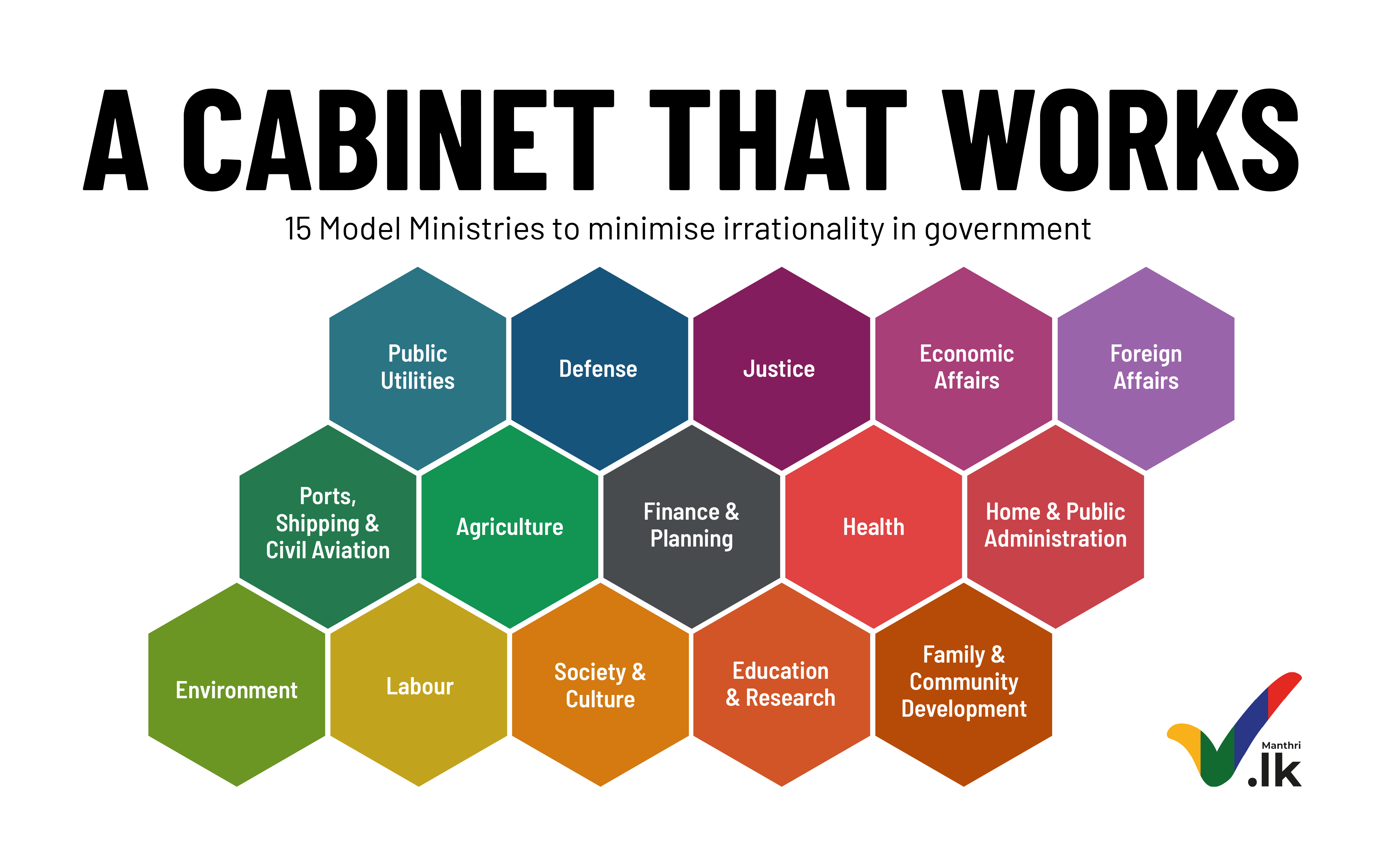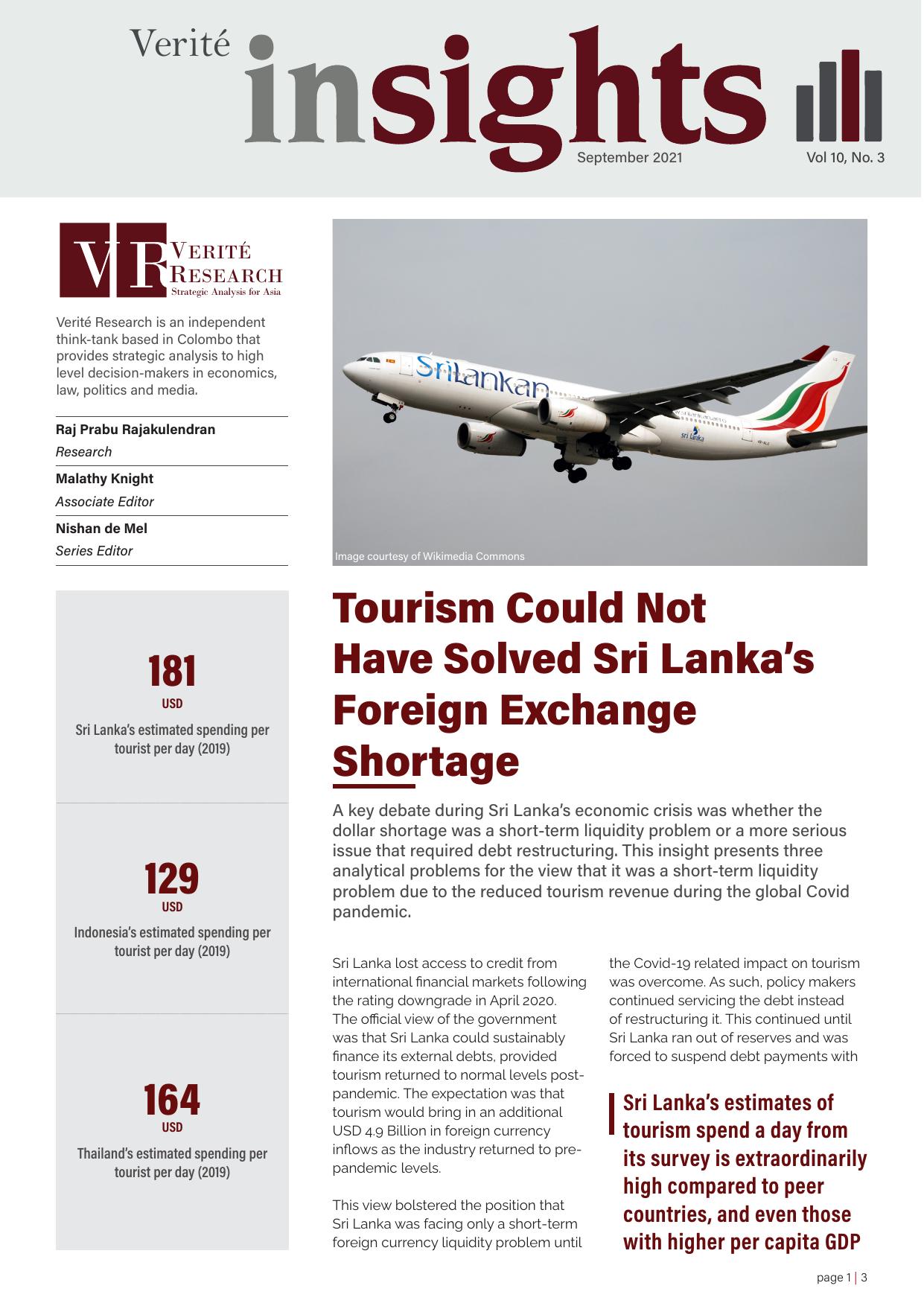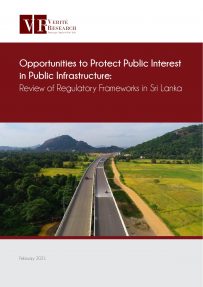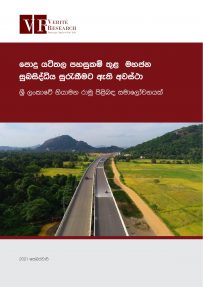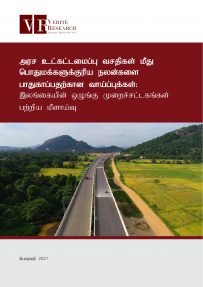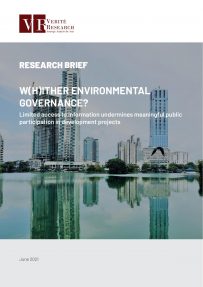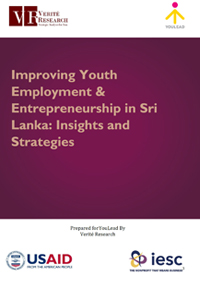A ‘Blueprint for a Rational Government in Sri Lanka‘, created by Verité Research and Manthri.lk, seeks to implement the recommendations from the White Paper on “A Rational Method for Cabinet Formation in Sri Lanka“, published in 2020. It lists down the duties and functions, institutions and acts to be implemented under the 15 ministries proposed in the annexures of the White Paper, following revisions that were supported by extensive expert consultation. This document is the blueprint by which governments can solve 3 key issues relating to irrational cabinet formation: 1. Misalignment of subjects Unrelated subjects being grouped together under one ministry. 2. Fragmentation of subjects Related subjects being split across different ministries. 3. Not having a fixed structure for ministries and their institutions Ministry purviews often change alongside ministerial appointments and shuffles, resulting in institutions shifting from ministry to ministry. The document takes on the form of an extraordinary gazette, and serves as a starting point for a more effectively and efficiently structured form of government.
In 2010, Sri Lanka established a unique framework, overseen by the Standing Cabinet Appointed Review Committee (SCARC), to handle unsolicited proposals (USPs) for public infrastructure funding. These USPs inherently bypass traditional competitive bidding in procurement. The report, ‘Foregoing Competition to Secure Funding for Public Infrastructure: One-Third of Funding Secured was Non-Concessional’, scrutinizes this framework. It reveals a significant discrepancy between the framework’s intended purpose of improving USP evaluation and the actual outcomes, with a substantial portion of the funding secured through SCARC being non-concessional in nature. The report identifies two vulnerabilities in the existing procurement framework that need urgent attention: the Cabinet’s unchecked power to modify procurement guidelines, and SCARC’s ability to approve projects non-compliant with even the minimum criteria outlined without repercussions.
A key debate during Sri Lanka’s economic crisis is whether the current dollar shortage is a short-term liquidity problem or a more protracted and systemic issue that requires debt reduction. This insight responds to the view that the dollar shortage is a short-term liquidity problem primarily caused by reduced tourism revenue since the onset of COVID-19. As this insight describes, there are three reasons to be skeptical of this argument.
China was the leading provider of external finance to Sri Lanka for infrastructure development during 2010-2016 accounting for 37% of the total. Sri Lanka borrowed USD 5,895 million from China for infrastructure development during this period. More than half of these loans from China (53%) came through a special regulatory framework set up in 2010, enabling the government to entertain unsolicited proposals (USPs) for public funded infrastructure projects circumventing the normal competitive procurement process. This research paper analyses the design and the actual practice of this special regulatory framework. The analysis aims to assess the extent to which the design and the actual execution of the special framework facilitated the realisation of its intended objectives.
Investment into infrastructure is vital for development. However, in the context of weak governance, public investment into large and complex infrastructure can become a fertile ground for corruption and results in unsustainable, costly, and poor-quality infrastructure that fails to meet the intended objectives.
යටිතලපහසුකම් සඳහා කරන ආයෝජනයන් රටක සංවර්ධනයට අතිශයින් වැදගත් වේ. කෙසේ වෙතත් දුර්වල පාලනයක් පවතින සන්දර්භයක් තුළ මහා පරිමාණ සහ සංකීර්ණ යටිතලපහසුකම් සංවර්ධන ව්යපෘති දුෂණයන්ට ඉතා හිතකර පසුබිමක් බවට පත්විය හැකි අතරම අපේක්ෂිත අරමුණු සාක්ෂාත් කරගැනීමට අපොහොසත් වන අධික පිරිවැයක් සහිත, ගුණාත්මක භාවයෙන් පහළ යටිතලපහසුකම් බිහිවීමටද එකී ආයෝජනයන් හේතු විය හැක.
உட்கட்டமைப்பில் முதலீடு செய்வது அபிவிருத்திக்கு இன்றியமையாதது. எவ்வாறாயினும், பலவீனமான ஆளுகையின் பின்னணியில், பெரிய மற்றும் பல்கூட்டு உட்கட்டமைப்பிற்கான அரச முதலீடு ஊழலுக்கான வளமான களமாக மாறி, விளைவாக நீடுறுதியல்லாத, செலவுகூடிய மற்றும் குறைதரமான உள்கட்டமைப்பை ஏற்படுத்துவதோடு உத்தேசித்த நோக்கங்களை நிறைவேற்றத் தவறிவிடுகிறது.
There is a surge in public agitation against environmental destruction caused by ongoing development projects in Sri Lanka. The surfacing of environmental issues after construction has commenced is highly problematic for two reasons. First, the construction may have already caused damage to the environment, which may be irreversible in certain cases. Second, the revising of original project plans to mitigate environmental damages can result in delays and increased costs.
Building on the Youth Labour Market Assessment published by Verite Research in 2018, this report focuses on a series of specific issues that represent key barriers to increasing youth employment and youth employability in Sri Lanka. Given the potential of youth entrepreneurship to serve as a key driver for increasing the labour force participation of youth, including young women, the current report also investigates key challenges and opportunities for increasing youth entrepreneurship in Sri Lanka.
රජයේ කි්රයාකාරීත්වය ඵලදායී සහ කාර්යක්ෂම මට්ටමක පවතින බව සහතික කිරීම සදහා කැබිනට් මණ්ඩලය ලබාදෙන දායකත්වය සුලූපටු නැත. නමුත් අප සිදුකළ පර්යේෂණයකින් අනාවරණය වූ ආකාරයට පසුගිය වසර කිහිපයේ මෙරට ඇති කෙරුණු කැබිනට් මණ්ඩලවලින් එවැනි දායකත්වයක් ලැබී නොමැත.
